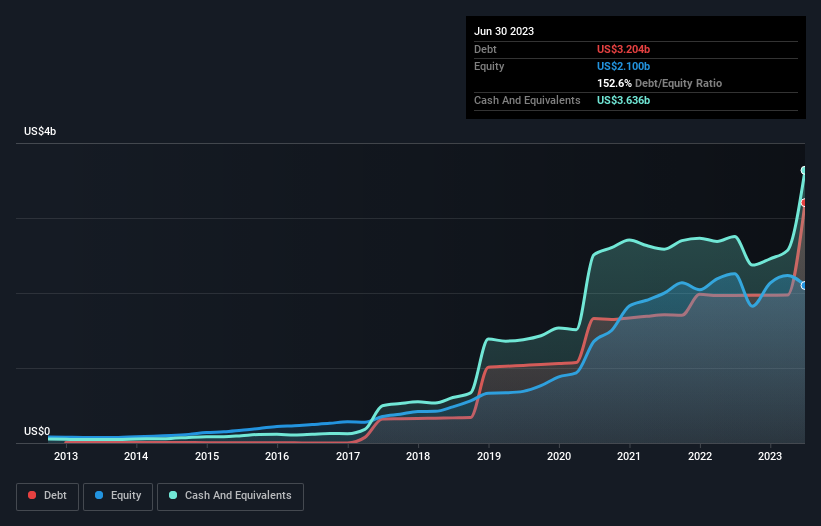
Howard Marks put it nicely when he said that, rather than worrying about share price volatility, 'The possibility of permanent loss is the risk I worry about... and every practical investor I know worries about.' So it might be obvious that you need to consider debt, when you think about how risky any given stock is, because too much debt can sink a company. Importantly, DexCom, Inc. (NASDAQ:DXCM) does carry debt. But the real question is whether this debt is making the company risky.
Why Does Debt Bring Risk?
Generally speaking, debt only becomes a real problem when a company can't easily pay it off, either by raising capital or with its own cash flow. Part and parcel of capitalism is the process of 'creative destruction' where failed businesses are mercilessly liquidated by their bankers. However, a more common (but still painful) scenario is that it has to raise new equity capital at a low price, thus permanently diluting shareholders. By replacing dilution, though, debt can be an extremely good tool for businesses that need capital to invest in growth at high rates of return. The first thing to do when considering how much debt a business uses is to look at its cash and debt together.
View our latest analysis for DexCom
What Is DexCom's Net Debt?
The image below, which you can click on for greater detail, shows that at June 2023 DexCom had debt of US$3.20b, up from US$1.97b in one year. But on the other hand it also has US$3.64b in cash, leading to a US$431.8m net cash position.

How Healthy Is DexCom's Balance Sheet?
According to the last reported balance sheet, DexCom had liabilities of US$2.07b due within 12 months, and liabilities of US$2.65b due beyond 12 months. On the other hand, it had cash of US$3.64b and US$755.6m worth of receivables due within a year. So its liabilities outweigh the sum of its cash and (near-term) receivables by US$328.5m.
Having regard to DexCom's size, it seems that its liquid assets are well balanced with its total liabilities. So while it's hard to imagine that the US$41.6b company is struggling for cash, we still think it's worth monitoring its balance sheet. Despite its noteworthy liabilities, DexCom boasts net cash, so it's fair to say it does not have a heavy debt load!
In addition to that, we're happy to report that DexCom has boosted its EBIT by 89%, thus reducing the spectre of future debt repayments. The balance sheet is clearly the area to focus on when you are analysing debt. But ultimately the future profitability of the business will decide if DexCom can strengthen its balance sheet over time. So if you're focused on the future you can check out this free report showing analyst profit forecasts.
Finally, a business needs free cash flow to pay off debt; accounting profits just don't cut it. DexCom may have net cash on the balance sheet, but it is still interesting to look at how well the business converts its earnings before interest and tax (EBIT) to free cash flow, because that will influence both its need for, and its capacity to manage debt. Over the most recent three years, DexCom recorded free cash flow worth 76% of its EBIT, which is around normal, given free cash flow excludes interest and tax. This free cash flow puts the company in a good position to pay down debt, when appropriate.
Summing Up
We could understand if investors are concerned about DexCom's liabilities, but we can be reassured by the fact it has has net cash of US$431.8m. And we liked the look of last year's 89% year-on-year EBIT growth. So is DexCom's debt a risk? It doesn't seem so to us. Another factor that would give us confidence in DexCom would be if insiders have been buying shares: if you're conscious of that signal too, you can find out instantly by clicking this link.
When all is said and done, sometimes its easier to focus on companies that don't even need debt. Readers can access a list of growth stocks with zero net debt 100% free, right now.
New: Manage All Your Stock Portfolios in One Place
We've created the ultimate portfolio companion for stock investors, and it's free.
• Connect an unlimited number of Portfolios and see your total in one currency
• Be alerted to new Warning Signs or Risks via email or mobile
• Track the Fair Value of your stocks
Have feedback on this article? Concerned about the content? Get in touch with us directly. Alternatively, email editorial-team (at) simplywallst.com.
This article by Simply Wall St is general in nature. We provide commentary based on historical data and analyst forecasts only using an unbiased methodology and our articles are not intended to be financial advice. It does not constitute a recommendation to buy or sell any stock, and does not take account of your objectives, or your financial situation. We aim to bring you long-term focused analysis driven by fundamental data. Note that our analysis may not factor in the latest price-sensitive company announcements or qualitative material. Simply Wall St has no position in any stocks mentioned.
About NasdaqGS:DXCM
DexCom
A medical device company, focuses on the design, development, and commercialization of continuous glucose monitoring (CGM) systems in the United States and internationally.
Flawless balance sheet with high growth potential.
Similar Companies
Market Insights
Community Narratives



